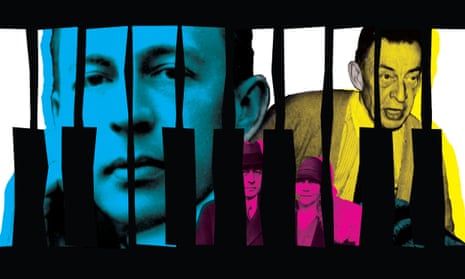All life goes into a book. Unless it’s a kiss’n’tell, this truth may bypass the reader. A study of steam trains or tax systems or, in my case, the Russian composer Sergei Rachmaninov (I’ll come back to the spelling) will seep into the crevices of a writer’s daily existence even if the resulting text appears harnessed in cool objectivity. Decisions are made, anecdotes abandoned because of a plumbing disaster, a knock at the door or a burnt cake. Words scuttle round your head at night and you wonder what possessed you.
Where does it all start? I had to retrieve my old diary to remember how (on earth), in January 2021, I agreed to deliver, 15 months later, 90,000 words on Rachmaninov for publication this year. It was the start of the second year of lockdown. The diary was virtually empty. Appointments were on Zoom, concerts I hoped to review mostly cancelled. I had checklists about my father, in his 90s, living alone far away: what was he eating apart from tins of rice pudding and chocolate biscuits? Could he get a vaccine? I can’t remember what the rules were for visiting by that time, but all encounters were a risk: my husband, the artist Tom Phillips RA, had a long-term lung condition so was in the vulnerable category for Covid-19.
So like most people whose work did not oblige them to be present, I stayed home. Days were spent in a small garden office (what crimes might I have committed without that hut). The sense of expulsion from a known existence hit everyone. To call it exile would be an affront to those millions experiencing enforced ejection from their country. The alienation, however, was real. When the days of ever more absurd exercise classes online and infuriating Duolingo language courses became too bizarre, I realised I needed to retrieve my writing self. I proposed a book to my publisher, Faber.
The plan was to explore the final part of Rachmaninov’s life, after his departure from revolutionary Russia in 1917 until his death in Beverly Hills in 1943. That quarter of a century has been more or less skimmed over in books on his music, because he composed only a handful of new works in exile. Nearly all the well-known pieces – three of the piano concertos, two of the symphonies – were written in Russia. What happened in those years? Why did he abandon a successful career as a conductor? Did he, as has been supposed, have a crisis of confidence, his creativity silenced by homesickness?
Before I could address any of these questions, I had to decide how to spell his name. The combination of transliteration (from Cyrillic), fashion and phonetic accuracy throws up different results. I went with the choice Rachmaninov himself made – Rachmaninoff – which is on his tombstone in Valhalla, upstate New York. House style at the Observer is with a “v”, which is also a universal option.
With a double anniversary year ahead – 2023 marks 150 years since Rachmaninov’s birth and 80 years since his death – the book had to be written at speed. As soon as the pandemic was over, I decided, I would make a quick dash to New York to stare at the places Rachmaninov lived; and on to the Library of Congress in Washington to take a cursory look at the archive (cursory because there is enough for a lifetime’s study, much of it already pored over by Russianist scholars and, to an extent, available. I would be approaching from a different direction, different sources.) In the UK, libraries were now open once again. I looked forward to scouring the catalogues and burying myself for hours behind my latest trawl of books. None of this, as things turned out, would happen.
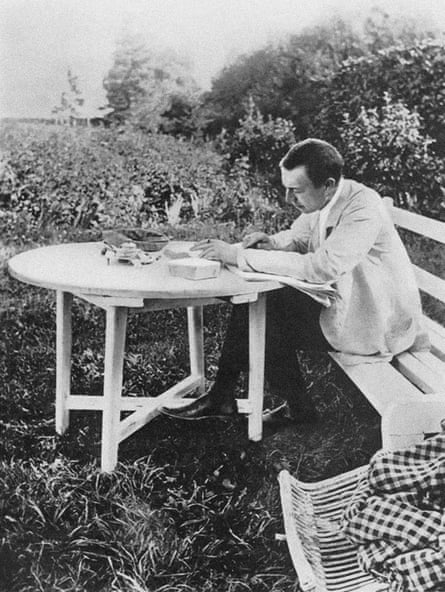
Rachmaninov has suffered the fate of the popular: snobbery. Some friends winced when I mentioned what I was writing about. (“Really? Is he your sort of thing?”) The Piano Concerto No 2 remains his best-loved work, if the Classic FM Hall of Fame is a measure. Knocking Vaughan Williams’s The Lark Ascending off the No 1 spot, it topped the annual poll in 2023 for the eighth time since the chart began in 1996 (Brief Encounter and The History Boys have contributed to its enduring popularity). A decade after Rachmaninov’s death, a rude dismissal of his music (“well-constructed and effective but monotone in its texture”) was written in Grove’s Dictionary of Music and Musicians (1954), a standard reference book whose attitudes held sway until a new edition came out nearly 30 years later. The writer in question, and editor of the dictionary itself, was the musicologist Eric Blom, a predecessor of mine as music critic of the Observer. Who’d trust a critic? I had work to do.
The story is rich and elliptical. With his wife and two daughters, Rachmaninov, at the age of 44, left St Petersburg (then called Petrograd) by train and sledge in December 1917, reaching Stockholm on Christmas Eve. His homeland was no longer a safe place for anyone born into the “white Russian” gentry. Rachmaninov, like so many he knew, lost everything: above all, the Ivanovka estate he so loved, where he had spent the long summers writing music. His security and the rhythm of his creative and professional life were shattered.
Quick GuideRachmaninov: a life
Show
Childhood
Born Sergei Vasilyevich Rachmaninov in 1873 into a musical-military family, the fourth of six children, in Novgorod, Russia. Escaped an anticipated army career when his dissolute father lost his fortune, sold the family estate and abandoned his wife, who took the children to live in a small flat in St Petersburg. Musically gifted from an early age, Rachmaninov went to the Moscow Conservatory to study with the great guru, Nikolai Zverev and caught the attention of Tchaikovsky.
Early crisis
After the disastrous premiere of his Symphony No 1 in 1897, Rachmaninov suffered depression and a breakdown. He attributed his recovery to the hypnotherapy treatments of Dr Nikolai Dahl, to whom he dedicated his Piano Concerto No 2 (1901).
Career in Russia
He was in demand as a conductor and pianist, as well as a composer. While still in Russia he wrote the bulk of his music (see below).
Career in the US and Europe
Left Russia with his wife, Natalya, and two daughters in the 1917 revolution, losing all his possessions and his Ivanovka estate. In the US he began a new career as a virtuoso pianist, with celebrity status. He built a house in Switzerland and travelled the world but wrote few new compositions.
Top works written in Russia
Three piano concertos, two symphonies, 83 songs, The Isle of the Dead (1909), The Bells (1913), All-Night Vigil (1915).
Top works written in exile
Rhapsody on a Theme of Paganini (1934), Symphonic Dances (1940).
Most popular work
Piano Concerto No 2, which made Marilyn Monroe’s character in Billy Wilder’s film The Seven Year Itch (1955) feel “goosepimply all over”. The work had already stirred dangerous emotions in a railway refreshment room as the soundtrack to David Lean’s film Brief Encounter (1945). Fiona Maddocks
In the US, the composer reinvented himself as a star virtuoso pianist, one of the most highly paid performers in the land. He was featured in fashionable magazines, moved in the same gilded society as Walt Disney and Charlie Chaplin (though neither was an intimate; Rachmaninov didn’t fall easily into friendships). Soon after his arrival in New York, in November 1918, amid armistice celebrations, he was mobbed, as one critic noted, by the flapper girls of Flatbush Avenue, Brooklyn. They wanted to hear his famous C sharp minor Prelude, a youthful work that became ubiquitous in rag and jazz versions as well as his own solemn, solo piano original, the bells of holy Russia written into its chiming chords.
Rachmaninov toured all over the US and Europe, giving concerts, crisscrossing the Atlantic on the latest luxury liner and shipping his latest luxury limo with him. He loved boats, early aeroplanes, gadgets. For a time he had his own railway carriage, complete with piano, to avoid endless nights in hotels. (The scheme was short-lived.) He built a stunning modernist villa on the banks of Lake Lucerne, Switzerland. He was also, in short, one of the greatest pianists of the century, a view still held by many virtuoso pianists today (thanks to the evidence of his recordings, many of which are easy to track down on YouTube).
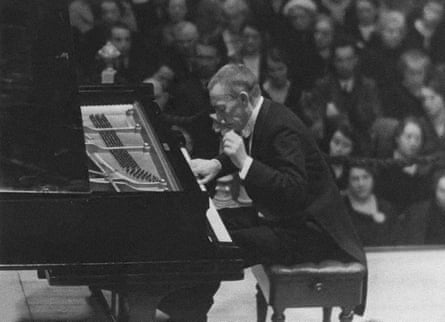
Pictures of Rachmaninov from this period show a tall, handsome man, suavely dressed, usually unsmiling, often with a cigarette between the beautiful long fingers of his famously large hands. This film-star image was only the outer garb of another existence entirely: of tireless, dogged hard work, rigorous hours of practice with associated painful hands, anxiety and chronic health issues. Despite his success and celebrity, he felt divorced from the act of composition that had for so long been his core activity.
When he did complete new works, he endured repeated disappointment, spurned by critics. He suffered family tragedy, as well as a second exile – from Switzerland in August 1939, on the eve of the second world war. He felt misunderstood, his music – romantic, melodic, yearning – dismissed as a throwback to the 19th century. Two fellow exiles, Arnold Schoenberg and Igor Stravinsky, now dominated the musical landscape with their radical experiments in harmony and rhythm. Rachmaninov was described as a ghost from the past, and even spoke of himself that way. Regarded as melancholy and reserved, he had an infectious sense of humour that he showed to his intimate friends. This side of his enigmatic personality, playful, at times ridiculous, is touchingly revealed in home movies.
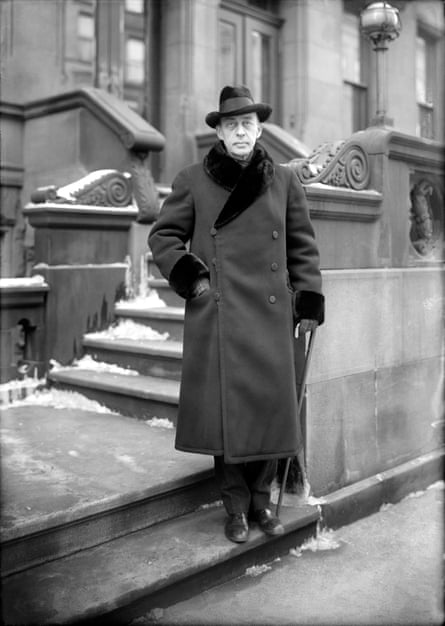
Scholars may spend a lifetime on a subject. Journalists have the privilege of immersing themselves in a topic, sharing an enthusiasm as adequately as they can to a wider audience, then moving on. The pitfalls hardly need stating: we remain guests, respectful of the amount we can never know, hoping to take away something of lasting value for all. It seems no surprise to me to range widely: it is the task of a critic. “Ah, you’re organising your fantasy dinner party,” a friend suggested. Having published books on the 12th-century composer-nun Hildegard of Bingen and the avant-garde composer Harrison Birtwistle, I could see his point. Birtwistle’s opinions were rarely mild. I checked what he had said: “I can’t stand Rachmaninov.” Rachmaninov did not survive long enough to hear Harry’s music, but he had chilly views on experimental modernism. Dinner would have been tense. We can only hope Hildegard might have distracted us with one of her visionary swoons.
I had some non-fantasy dinner issues of my own to sort out. Tom thought a good night out was John Cage followed by more John Cage. After once going with me to hear Rachmaninov’s Symphony No 2, he adopted the Harry stance. “I don’t need to hear that symphony again as long as I live.” It happens to be a favourite of mine. Would I be able to convince him that the composer, and the music itself, were more interesting than he thought? I valued Tom’s incisive editorial input but had no time to waste proving the validity of my subject.
In February 2022 the invasion of Ukraine occurred. World events, instead of endless Covid rules and threats, now absorbed our attention. As weeks of war turned into months, exile took on a sharper meaning. The placenames on the news, telling of the latest horrors from Kyiv or Kharkiv, resonated: these were cities Rachmaninov had visited, where he had conducted and performed. Media reports showed once grand edifices, some of them the very buildings in which he had played, reduced to rubble. A double timeline of suffering was unfolding.
Without my really noticing, Tom had become intrigued by Rachmaninov. (“That cello sonata is a pretty good piece…” “Yes, Tom.” “And those piano Études-Tableaux… very interesting.” “Yes, Tom.”) I would find him hunched over one of my books on the composer, decorating it with yellow Post-it notes to guide me to interesting points. The way he tore them into small scraps and carefully positioned them echoed the collages he was making in his studio, when not on Rachmaninov duty. Once signed up to the cause, he was a dedicated supporter. (He once translated an entire thick volume from German gothic font to English, writing it out in perfect calligraphy, because he thought the book would be useful for something I was working on.)
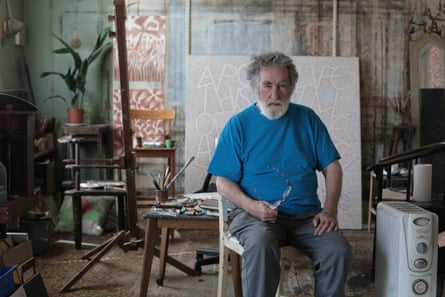
But now my own world was about to change. From my shed at the bottom of the garden I could hear, on the top floor of the house, Tom’s persistent coughing. Medicine was prescribed. It was winter. He still insisted on short constitutional walks every day but never wore a coat. I made an expedition to buy one, pleased to have tracked down a garment without logos or epaulettes or other ornament that would have irked him, in the same colour as all his other clothes, so I knew he would wear it. It was dull but warm. I returned from this rare outing with a light step.
The coat would never be removed from its bag. In the short time I was away, Tom had suffered a catastrophic haemorrhage. Ambulance, hospital, blood transfusions and other interventions followed. It was the dramatic start to a serious decline in his health. I attended the constant round of medical appointments with a sense of watching time and life disappear through a sieve. Somehow I forced myself to finish a draft of the book. Somehow, he read it, making detailed comments, sometimes too detailed for the frazzled author. (“I think here you mean ‘this’, not ‘that’.” “Yes, but what about the whole thing? Does any of it make any sense?”)
My deadline was close. I had booked, months earlier, to go to Berlin in October 2022 to hear Daniel Barenboim conduct his last Ring cycle. It would be a week’s holiday. (What music critics do on their holidays must wait for another time.) Barenboim cancelled, but his replacement, Christian Thielemann, would be well worth hearing. Tom was by now very unwell but could still, with various arrangements in place, be left alone. Instead of autumnal strolls in the Tiergarten, when not listening to Wagner I sat in the hotel room working on edits, a task nearly as epic as writing a book in the first place. That week turned out to be a vital bridge to completing the book. It also felt like riding two horses bareback.
Tom died shortly after my return from Berlin. He tried to read the last version of my book but could not. His illness had given him double vision. He was fond of a quote by Henry James: “We work in the dark – we do what we can – we give what we have. Our doubt is our passion, and our passion is our task. The rest is the madness of art.” I have thought about this often. In his last days, covering one eye in an attempt to see straight, Tom worked on, making art.
Rachmaninov died in California on 28 March 1943, just before his 70th birthday. He was surrounded by Russian friends, part of the diaspora drawn to Hollywood by the lure of the embryonic film industry. They could “play” themselves, as Russian counts, princesses, generals, in romanticised depictions of an imperial Russia that no longer existed. As he neared the end, the composer listened to the wireless and worried about the news from Russia. The Red Army had taken back some cities, but Nazi forces had captured Kharkiv. Barely conscious, he moved his hands over the bed linen, as if across a piano keyboard. Who, he asked his wife, Natalya, was playing the music he could hear? It was in his head, as it always had been, and would be to the last.
Goodbye Russia: Rachmaninoff in Exile by Fiona Maddocks will be published by Faber on 1 June. To support the Guardian and Observer order your copy at guardianbookshop.com. Delivery charges may apply
